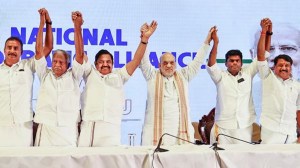Ode to a Grecian miracle
8216;8216;What shaped as an ancient Greek tragedy for over four years last night wondrously emerged as a modern Greek miracle.8217;14...

8216;8216;What shaped as an ancient Greek tragedy for over four years last night wondrously emerged as a modern Greek miracle.8217;8217; This is the most apt description of Greece8217;s 8216;transformation8217; from 8216;near cancellation8217; to 8216;near perfection8217; at the opening ceremony of the Athens Olympics. This can8217;t be truer! I was in Athens in the first week of March, barely five months from the start of the Olympic extravaganza. We were a bit excited to be in the ancient city that gave the world its modern Olympics besides many other things. We expected the city to be all decked up and spruced ready for the great event. But we hardly saw any sign of this anywhere.
Being a sports buff, I kept pressing our hosts to give us a tour of the Olympic stadia and facilities so we could recall them while watching the events live back home. Though our hosts were extremely hospitable otherwise, every time I made this request they politely ducked it.
Only after two days of moving around the city on official engagements did we realise as to why our hosts were hesitant to take us around the Olympics infrastructure. It was just that everything was in disarray and Greeks were treating Olympics more as a nightmare than as something to look forward to. The chaos on the roads, worse than any Indian city, was telling evidence. At a luncheon hosted by the Mayor of Holargos, the home of Pericles, considered the most glorious man in the ancient Athenian democracy, I expressed my surprise about the city8217;s 8216;Olympic unpreparedness8217; and the casual attitude of the Greeks.
The Mayor was unfazed and his response was typical of a Greek: 8216;8216;We in Greece have a pantheon of Gods and Goddesses in whom we believe. We are confident that one of them will come down and take charge and the Olympics will go through without any hitch.8217;8217;
I thought that the Mayor8217;s statement was in lighter vein. But from what we have seen at the opening ceremony and the first days of events it seems that the Mayor was serious, and he was right. It looks as if Goddess Athena, after whom Athens is named, had herself come down and taken charge through the elegant Gianna Angelopoulos-Daskalaki, the Chief Organiser of the Olympic Games, and performed the miracle. Presenting the 8216;Greek miracle8217; before 75,000 dignitaries, officials and spectators assembled inside the main Olympic Stadium and an estimated global television audience of four billion, 8216;the lady behind the Games8217; declared: 8216;8216;Greece is standing before you. We are ready. We have waited long for this moment.8217;8217;
This exotically beautiful land-sea nation had given humanity its most precious gift8212;freedom and democracy. To the world its noblest philosophers8212;Socrates, Plato, Aristotle8212;and some of its bravest warriors, the most famous being Alexander. After a long period of 25 centuries, metamorphosing through the most ancient of civilisations, tempered by wars and ravaged by dictatorship, Greece is now standing before the world. The country that gave the world its most civilised form of governance is ready now to dedicate itself to another gift that civilised nations are craving for, peace. International Olympic Committee president Jacques Rogge seized the opportunity and urged athletes to 8216;8216;show us that sport unites by overriding national, political, religious and language barriers8217;8217;. Sensing the mood of the world, he said: 8216;8216;We need peace, we need tolerance and we need brotherhood.8217;8217;
Outside the giant Olympic stadium, there was telltale evidence of the 8216;Greek miracle8217;8212;dirt expanses instead of landscaped paths, idle cranes and trees planted just last week. Alex Gilady, an IOC member who helped oversee the preparations, noted how much was at stake if the Greeks had failed. 8216;8216;I think you have saved Greece and the IOC from great humiliation,8217;8217; he told Athens organisers.
But the Greeks did not fail. Amidst overwhelming odds, this small nation of 13 million inhabitants showed the grit and tenacity of their forefathers in the Battle of Thermopylae when hundred brave soldiers stopped the Persian army from over running Greece and its legacy of Freedom and Democracy. Faith in Gods has kept the spirit of freedom flying, making it easier for us to walk the path of peace.
- 01
- 02
- 03
- 04
- 05































